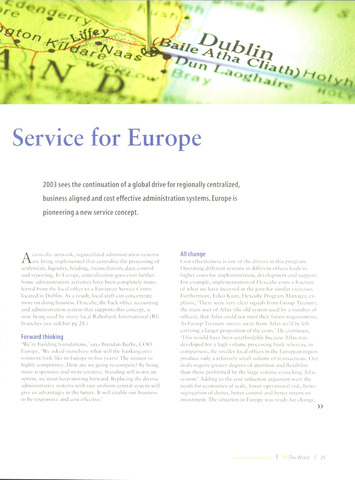Service for Europe
2003 sees the continuation of a global drive for regionally centralized,
business aligned and cost effective administration systems. Europe is
pioneering a new service concept.
Forward thinking
All change
Across the network, regionalized administration systems
are being implemented that centralize the processing of
settlement, liquidity, funding, reconciliation, data control
and reporting. In Europe, centralization goes even further.
Some administration activities have been completely trans-
ferred front the local office to a European Service Centre
located in Dublin. As a result, local staff can concentrate
more on doing business. Flexcube, the back-office accounting
and administration systern that supports this concept, is
now being used by many local Rabobank International (RI)
branches (see sidebar pg 28.)
'We're building foundations,' says Brendan Burke, COO
Europe, 'We asked ourselves: what will the banking envi
ronment look like in Europe in five years? The answer is:
highlv competitive. How are we going to compete? By being
more responsive and more creative. Standing still is not an
option, we must keep moving forward. Replacing the diverse
administrative systems with one uniform central system will
give lis advantages in the future. It will enable our business
to be responsive and cost effective.'
Cost effectiveness is one of the drivers in this program.
Operating different systems in different offices leads to
higher costs for implementation, development and support.
For example, implementation of Flexcube costs a fraction
of what we have incurred in the past for similar exercises.
Furthermore, Felco Kaan, Flexcube Program Manager, ex-
plains, 'There were very clear signals from Ciroup Treasury,
the main user of Atlas (the old system used by a number of
offices), that Atlas could not meet rheir future requirements.
As Group Treasury moves away from Atlas we'd be left
carrving a iarger proportion of the costs.' He continues,
'This would have been unaffordable because Atlas was
developed for a high volume processing bank whereas, in
comparison, the smaller local offices in the Furopean region
produce only a relatively small volume of transactions. Our
deals require greater degrees of attention and flexibility
than those performed by the large volume-crunching Atlas
system.' Adding to the cost reduction argument were the
needs for economies of scale, lower operational risk, better
segregation of duties, better control and better return on
investment. The situation in Europe was ready for change.
The Word I 25

